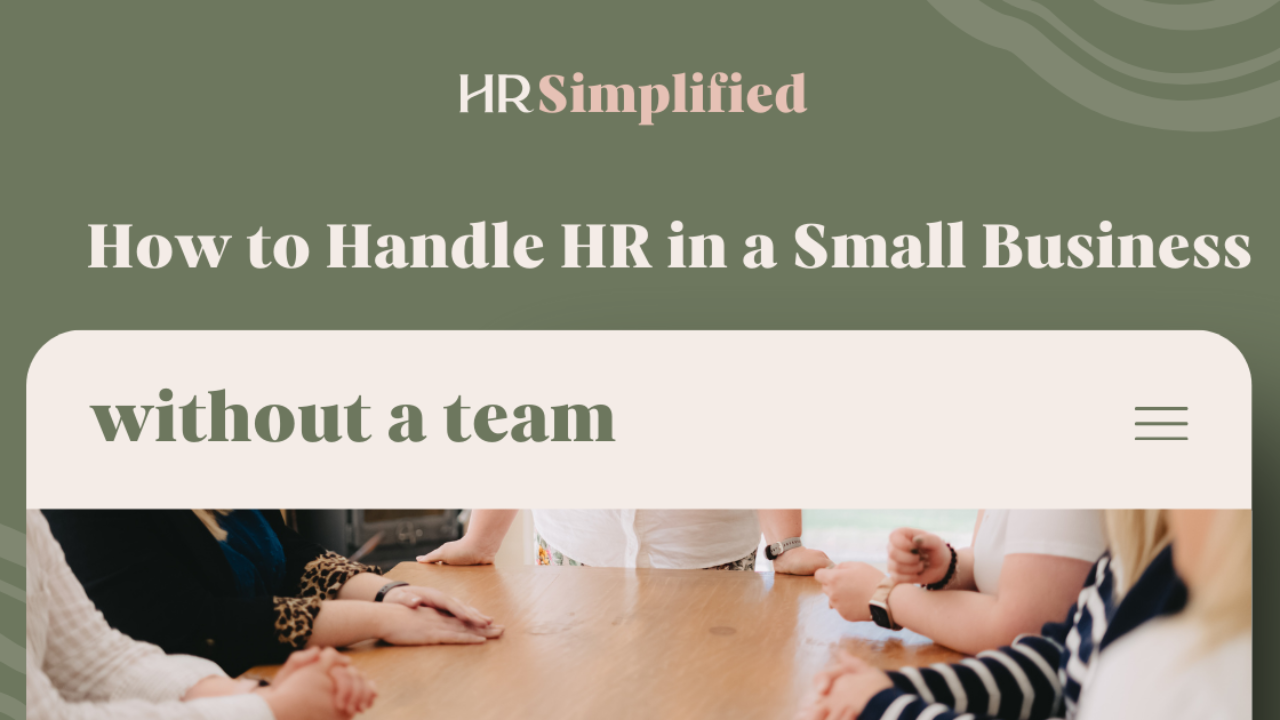How to Handle HR in Small Business without a team
Sep 17, 2025
Running a small business means wearing all the hats - finance, operations, sales, and yes… HR. But what happens when you don’t have a dedicated HR team member?
The truth is, most small businesses in Australia don’t. That doesn’t mean you’re on your own. With the right systems, advice, and a people-first approach, you can manage HR with confidence and peace of mind.
In this article, we’ll unpack the essentials of handling HR without an internal team. You’ll learn the difference between compliance and best practice, why systems matter, and how to access the right support without hiring a full-time HR manager.
🎧 Listen to the full podcast episode here:
📺 Prefer to watch? Catch the full conversation on YouTube:
Why Most Small Businesses Don’t Have an HR Team
The majority of small businesses operate without an internal HR department. Instead, business owners, office managers, or operations leads end up taking on HR tasks — often with little training.
That might mean juggling contracts, handling employee questions, and keeping up with workplace compliance — all while trying to grow the business. Without the right support, it can feel overwhelming.
But here’s the good news: you don’t need to hire a full-time HR manager to get HR right. You simply need clarity, systems, and support.
Compliance vs Best Practice: Knowing the Difference
One of the most common sources of confusion for small businesses is the difference between compliance and best practice:
- Compliance – the legal minimum. Understanding the Fair Work Act, the awards that apply to your employees, and the basics of contracts, pay, and leave entitlements.
- Best Practice – going beyond the minimum. Creating a positive workplace culture, engaging your employees, and building a team that’s motivated to stay and contribute.
Both matter. But best practice is what transforms your team from “just showing up” to thriving.
The Power of Simple HR Systems
Good HR doesn’t have to mean pages of policies or complicated tech. What matters is creating systems that make life easier for both you and your team.
That could look like:
-
Clear onboarding and offboarding checklists
-
A central place for storing employee documents securely
-
Simple processes for signing contracts and managing payroll
-
Employee resources that reduce repeated questions
When systems are in place, you free up time and reduce the risk of mistakes that could cost your business in the long run.
Why You Need Reliable HR Advice
HR is one of those areas where “Google won’t cut it.” Getting advice that is accurate, practical, and people-first is essential.
But here’s the key: not all HR advice is the same. Lawyers and HR consultants both play a role, but they approach situations differently. A lawyer might focus on legal risk, while an HR consultant helps with people management, culture, and day-to-day support.
The right HR partner will help you:
-
Interpret the Fair Work Act correctly for your business
-
Apply the right awards to the right roles
-
Handle employee challenges with clarity and confidence
-
Build systems that suit your stage of business
You Don’t Need a Full-Time HR Manager
What you do need is a trusted HR partner who can provide support that’s:
✔ Affordable
✔ Accessible
✔ Tailored to small business
That’s exactly why I created The HR Link – HR support in your pocket, designed specifically for small business owners who want to lead with clarity, care, and confidence.
Final Thoughts
HR in small business doesn’t have to be overwhelming. With a clear understanding of compliance, people-first best practice, and the right systems, you can manage HR without an internal team — and without the stress.
If you’re ready for HR to feel simpler, check out The HR Link – your people-first HR partner designed for Australian small businesses.
And don’t forget to subscribe to The HR Link: People-First Conversations on Spotify, Apple Podcasts, YouTube, or wherever you listen, so you never miss an episode.

